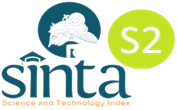Implementasi Pendekatan Saintifik Pada Sintaks Discovery/Inquiry Learning, Based Learning, Project Based Learning
DOI:
https://doi.org/10.33477/bs.v8i1.850Abstract
One of the demands of the 2013 curriculum is the use of a scientific approach to learning. The existence of this approach certainly requires adequate knowledge by the teacher about learning and its implementation in the classroom. Therefore, the purpose of this study is to describe the relationship of the five stages of the scientific approach (5M) with the syntax of several learning models (discovery/inquiry learning, based learning, project based learning). To answer these objectives, references and relevant research results are used through library studies. Analysis of the relationship of the five stages of the scientific approach to the syntax of the learning model is done by a structural approach. The results of the study indicate that the scientific approach can be used together with the learning model. The five stages of the scientific approach can be synchronized with the syntax of the existing learning model. The results of this study are the provision of knowledge for teachers in preparing learning plans and applying them in classroom learning. Key Words: Scientific Approach, Syntax, Doscovery LearningReferences
Aqib, Zainal. (2014). Model-model, Media dan Strategi Pembelajaran Kontekstual (Invatif). Bandung: CV Yrama Widya.
Banawi, Anasufi. (2014). Keefektifan Strategi Project Base Learning dalam Meningkatkan Kreativitas dan Hasil belajar IPA-Fisika pada Mahasiswa Fakultas Ilmu Tarbiyah dan Keguruan IAIN Ambon Angkatan 2013. Jurnal Inovasi, 8(4), hlm. 369-380.
Herdian. (2010). Metode Pembelajaran Discovery (Penemuan). Diakses dari http://www.salamedukasi.com/2014/06/definisi-contoh-model- pembelajaran.html. http://tryplek.blogspot.com/2011/06/pengertian-pendekatan-struktural/html?m=1.
Kementerian Pedidikan dan Kebudayaan. (2016). Panduan Teknik Pembelajaran Dan Penilaian Di Sekolah Dasar. Jakarta: Direktorat Jendral Pendidikan Dasar Dan Menengah. Direktorat Jendral Pembinaan Sekolah Dasar
Kementerian Pendidikan dan Kebudayaan. (2018). Materi Penyegaran Istruktur Kurikulum 2013 Sekolah Menengah Pertama. Jakarta: Direktorat Jendral Pendidikan Dasar Dan Menengah
Mayasari, Tantri., Kadarohman, Asep., Rusdiana, Dadi, dan Kaniawati, Ida. (2016). Apakah Model Pembelajaran Problem Based Learning dan Project Based Learning mampu Melatihkan Keterampilan Abad 21? JPFK, 2(1), hlm. 48-55.
Peraturan Menteri Pendidikan dan Kebudayaan Nomor 22 Tahun 2016 tentang Standar Proses Pendidikan Dasar dan Menengah.
Permendikbud Nomor 103 Tahun 2014 tentang lampiran pembelajaran pada pendidikan dasar dan pendidikan menengah.
Roestiyah, N.K. (2008). Strategi Belajar Mengajar. Jakarta: Rineka Cipta.
Sani, Ridwan Abdullah. (2015). Pembelajaran Saintifik untuk Implementasi Kurikulum 2013. Jakarta: Bumi Aksara.
Undang-Undang Nomor 20 Tahun 2003 tentang Sistem Pendidikan Nasional.
Wena, Made. (2010). Strategi Pembelajaran Inovatif Kontemporer (Suatu Tinjauan Konseptual Operasional). Jakarta: Bumi Aksara.
Downloads
Published
Issue
Section
License
Authors who publish with this journal agree to the following terms: Authors retain copyright and grant the journal right of first publication with the work simultaneously licensed under a Creative Commons Attribution License that allows others to share the work with an acknowledgement of the work's authorship and initial publication in this journal. Authors are able to enter into separate, additional contractual arrangements for the non-exclusive distribution of the journal's published version of the work (e.g., post it to an institutional repository or publish it in a book), with an acknowledgement of its initial publication in this journal. Authors are permitted and encouraged to post their work online (e.g., in institutional repositories or on their website) prior to and during the submission process, as it can lead to productive exchanges, as well as earlier and greater citation of published work.














